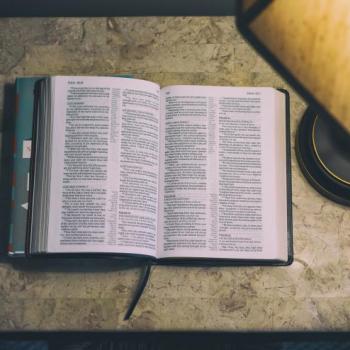 A few weeks ago, a Kickstarter Campaign caught my attention. It’s called The Scribe Bible Journal and carries the tag line: “Get Your Quiet Times Done”. As someone who has regularly struggled with consistent, long-term quiet times, I find the project very interesting. You might say my inconsistencies are consistently frustrating.
A few weeks ago, a Kickstarter Campaign caught my attention. It’s called The Scribe Bible Journal and carries the tag line: “Get Your Quiet Times Done”. As someone who has regularly struggled with consistent, long-term quiet times, I find the project very interesting. You might say my inconsistencies are consistently frustrating.
The SCRIBE Bible Journal claims to be the world’s first “habit-forming bible study system” and if The Scribe Bible Journal can truly aid me in becoming more consistent in my devotional times – then I am all for it. For these reasons, I decided to reach out to creator, Yed Anikpo, and learn more.
1) Can you tell me a little about your background and what brought you to start The SCRIBE Bible Journal Project?
Sure! My name is Yed Anikpo, I’m originally from Cote d’Ivoire, and I currently reside in Minneapolis where I’m married with three children.
As a serial entrepreneur, I’m always on the lookout for ways to be more productive – especially since I have young children; my oldest is 6. While looking online one day, I stumbled across the work of Dr. Peter Gollwitzer from NYU on implementation intentions or “if-then” planning. Reading further, I found over 100 studies showing that deciding in advance when and where one will take specific actions to reach their goal can double, or triple, their chances of success. I was intrigued.
At around the same time, I asked my audience (about 20k Christians who’d subscribed to my email list) what was their number one frustration when it comes to their engagement with Scripture. The majority responded saying it was a lack of time. later, I found that information was corroborated by Barna’s State of the Bible report where their polls showed that half of weekly Bible readers identified lack of time as their #1 problem when it comes to their Bible reading.
So, I thought this is a problem that a lot of people seem to have so why not apply implementation intentions (if-then planning) to the most important goal anyone can have, namely reading and meditating on Scripture. That’s how the SCRIBE Bible Journal was born.

2) What makes The Scribe Project different from other bible study tools?
The SCRIBE Bible Journal is the only Bible study tool that I know of that incorporates motivational, psychology principles to help Christians cultivate a habit of reading and meditating on Scripture. Specifically, the daily layout provides users with an easy way to apply the “If-Then” planning technique to plan their Bible reading the night before. As I mentioned, using that technique alone can double or triple one’s chances of actually doing what they set out to do.
The journal comes with a 2-year Bible reading plan and provides an easy way for its users to meditate on what they read in Scripture by using a modified version of the S.O.A.P Bible study method.
SCRIBE uses many other psychological “hacks” to get Christians into Scripture. I can’t get into all of them here, but I’d recommend reading this article where I detail five of them HERE.
3) How have the techniques used in the Scribe Project changed your quiet times?
The SCRIBE Bible Journal has helped me stay much more consistent with my quiet times. I’ve also benefited in many other ways. As part of the journal process, I write down every day one thing I’m grateful to God for in the evening. I’ve found I feel happier and more content. Science shows that engaging in thoughts of gratitude increases serotonin and dopamine levels in your brain while reducing cortisol levels (a stress hormone) by as much as 23%.
4) What are some long-term goals for The Scribe Project?
After the Kickstarter campaign ends, we will put the journal for sale on our e-commerce website (https://www.scribebiblejournal.com/) and we will also list it on Amazon. One day, we hope to expand into brick-and-mortar.
In the long term, I’d like to create some more journals and planners under the same publishing company, Lyfebooks. My vision for this company is to help improve the spiritual lives of Christians by creating beautiful and meaningful tools.
5) How do you think technology has changed quiet times? Has it helped or hurt?
Here I’ll let the great John Piper answer for me. He wrote, “One of the great uses of Twitter and Facebook will be to prove at the Last Day that prayerlessness was not from lack of time.”
As with everything, there needs to be a balance. Technology has made the Bible and other biblical and theological resources available to all at the click of a mouse. I have John Calvin’s 22,000-page Commentary of the Bible in my phone that literally fits inside my pocket – and that’s amazing. At the same time, the widespread usage of cellphones, and especially of Facebook, is having a detrimental effect on Christians. We are becoming addicted to these things, and as a result most of our free time is spent getting our dopamine fix on social media instead of meditating on Scripture and seeking God’s face through earnest prayer.
6) Anything else you would like to add in closing?
I’d like to look at Scripture and answer this question: How do we become more Christlike?
2 Corinthians 3:18 reads: “But we all, with open face beholding as in a glass the glory of the Lord, are changed into the same image, from glory to glory, even as by the Spirit of the Lord.” We can learn four things from the above Scripture.
- The Bible is a mirror that reflects to us the glory of Christ.
- We are changed into that same image by beholding or contemplating that glory (Wow! Just think about that for a second).
- This change happens progressively over time.
- This progressive change is affected by the power of the Holy Spirit.
So, how do we become more like Christ? By beholding or contemplating Christ as He is revealed to us in Scripture. To behold or contemplate means to view or consider something with continued attention. In other words, we grow in Christlikeness by meditating on Scripture. SCRIBE is designed to help you prioritize and implement this transformative contemplation every day until it becomes a habit.













